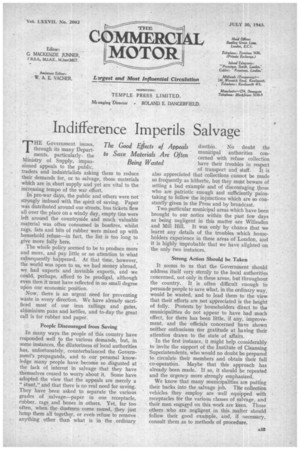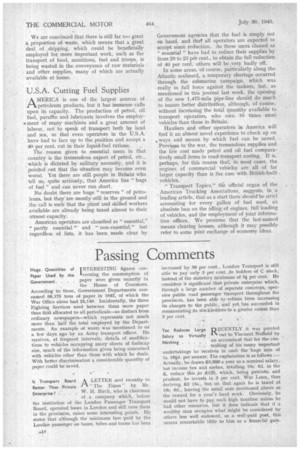Indifference Imperils Salvage
Page 15

Page 16

If you've noticed an error in this article please click here to report it so we can fix it.
T. HE Government issues, through its many nepart ments, particularly. the Ministry of Supply, impassioned appeals to the public, traders and indu-strialists asking them to reduce their demands for, or to salvage, those materials which are in. short supply and yet are vital to the• increasing tempo of the war effort.
In pre-war days, the public and others were not strongly imbued with the spirit of saving. Paper was distributed around our streets, bus tickets flew all over the place on a windy day, empty tins were left around the countryside and much valuable material was often consumed in bonfires, whilst rigs, fats and bits of rubber were mixed up with household refuse—in fact, the list is too long to give more fully here. . .
The whole policy seemed to be to produce more and more, and pay little or no attention to what subsequently happened, At that time, however, the world was open to us, we had money abroad, we had exports and invisible exports, and we could, perhaps, afford to be prodigal, although even then it must have reflected in no small degree ujOri our economic position.
.Now, there is an urgent need for preventing waste in every direction. We have already sacri ficed most of our iron railings and gates, aluminium pans and kettles, and to-day the great call is for rubber and paper. .
People Discouraged from Saving In Many ways the people of this country have responded well to the various demands, but, in some instances, tile dilatoriness of local authorities has, unfortunately, counterbalanced the Government's propaganda, and to our personal knowledge many people have become so .disgusted at the lack of interest in salvage that they have themselves ceased to worry about it. Some have adopted the view that the appeals are merely a "stunt," and that there is no real need for saving. They have been asked to separate the various grades of salvage—paper in one receptacle, rubber, rags, and bones in others. Yet, far too often, when the dustmen come round, they just lump them all togethv, or even refuse to remove anything other than what is in the , ordinary dustbin. No doubt the municipal authorities concerned with refuse collection have their troubles in respect of transport and staff. It is also appreciated that collections cannot be made so frequently as hitherto, but they must beware of setting a bad example and of discouraging tbose who are patriotic enough and sufficiently painstaking to follow the injunctions which are so Onstantly given in the Press and by broadcast.
Two particular municipal areas which have been• brought to our notice within the past few days as being negligent in this matter are Willesden and Mill Hill. It was only by chance that we learnt any details of the troubles which householders experience in these areas of "London, and it is highly improbable that we have alighted on -the only two instances.
Strong Action Should be Taken It seems to us that the Government should address itself very sternly to the local authorities concerned, not only in these areas, but throughout the country. It is often difficult enough to persuade people to save what, in the ordinary way, would be wasted, and to lead them to the view that their efforts are ,not appreciated is the height of folly. Protests by householders direct to the municipalities do not appear to have had much effect, for there has been little, if any, improvement, • and the officials concerned have shown neither enthusiasm nor gratitude at having their attention drawn to the state of affairs.
In the first instance, it might help considerably to invite the support of the Institute of Cleansing Superintendents, who would no doubt be prepared to circulate their members and obtain their full co-operation. Maybe that this approach has already been made. If so, it should be repeated and the urgency more strongly emphasized.
We know that many municipalities are putting their backs into the salvage job. Tile collection vehicles they employ are well equipped with receptacles for the various classes of salvage, and their men engaged on this work are keen. Those Others who are negligent in this matter should follow their good example, and, if necessary, consult them as to methods of procedure. We are convinced that there is still far too great a proportion of waste, which means that a great deal of shipping, which could be beneficially employed for more important work, such as the transport of food, munitions, fuel and troops, is being wasted in the conveyance of raw materials and other supplies, many of which are actually available at home.
U.S.A. Cutting Fuel Supplies
A MERICA is one of the largest sources of petroleum products, but it has immense calls upon its capacity. The production of petrol, oil fuel, paraffin and lubricants involves the employ • ment of many machines and a great amount of labour, not to speak of transport both by land and sea, so that even operators in the U.S.A. have had to face up to the position and accept a 40 per cent, cut in their liquid-fuel rations.
The reason given to essential users in that country is the tremendous export of petrol, etc., which is dictated by military necessity, and it is pointed out that the situation may become even worse. Yet there are still people in Britain who tell us, quite seriously, that America has " bags of fuel " and can never run short.
No doubt there are huge " reserves " of petroleum, but they are mostly still in the ground and the call is such that the plant and skilled workers available are already being taxed almost to their utmost capacity.
American operators are classified as essential," "partly essential" and "non-essential," but regardless of lists, it has been made clearby Government agencies that the fuel is simply not on hand, and that all operators are expected to accept some reduction. As those users classed as " essential " have had to reduce their supplies by from 20 to 25 per cent., to obtain the full reduction of 40 per cent. others will be very badly off.
In some areas, of course, particularly along the Atlantic seaboard, a temporary shortage occurred through the submarine campaign, which was really in full force against the tankers, but, as mentioned in this journal last week, the opening of the new 1,475-mile pipe-line should do much to ensure better distribution, although, of course, without incrdasing the total quantity available to transport operators, who own 10 times more vehicles than those in.Britain.
Hauliers and other operators in America will find it an almost novel experience to check up on ways and means by which fuel can be saved. Previous to the war, the tremendous supplies and the low cost made petrol and oil fuel comparatively small items in road-transport costing. It is, perhaps, for this reason that, in most cases, the engines of commercial vehicles are all of far larger capacity than is the case with British-built vehicles.
" Transport Topics," the official organ of the American Trucking Associations, suggests, in a leading article, that as a start there should.be strict accounting for every gallon of fuel used, an absolute ban on the idling of engines, fish' loading of vehicles, and the employment of joint information offices. We presume that the last-named means clearing houses, although it may possibly refer to some joint exchange of economy ideas.




















































